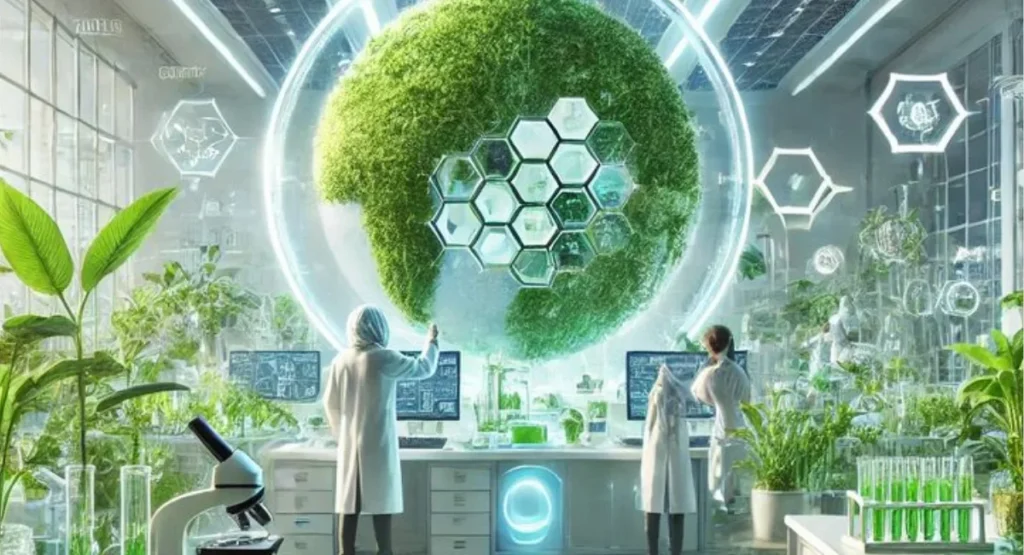Introduction: Anne Gibbon –Where AI Meets Biotech
Innovation that is occurring on the interdisciplinary boundaries in the modern rapidly evolving world. AI in Biotech is one of the most fascinating crossings. Artificial intelligence has already transformed such industries as finance, marketing and transportation. But once it is combined with biotechnology, the science of knowing life in its ingrained nature, then the possibilities become revolutionary.
Anne Gibbon, the co-founder of Aethon AI is at the center of this revolution. She is one of the next generation of leaders to embrace the power of AI no longer as a cause of automation but as an ally in the search. Her contribution is transforming the scene in which labs handle drug discovery, genetics and life sciences research. Rather than taking years to get an answer to the discovery of new molecules, therapies, or genetic pathways, scientists can now find them in monthly, or weekly, increments, courtesy of smart algorithms.
This blog dives deep into the journey, company and the global healthcare revolution with AI-based driver Anne Gibbon, founder of the Aethon AI.
Who Is Anne Gibbon?
Anne Gibbon is more than just a technology entrepreneurshe is a visionary at the forefront of a movement. With a strong background in both science and technology, she recognized early on that the future of healthcare would depend on smarter tools for research.
Her entrepreneurial spirit led her to co-found Aethon AI, a company focused on developing AI-powered solutions for laboratories. Her mission is not just to make research faster but to make it more accessible, precise, and scalable.
Anne’s leadership style blends innovation with purpose. She often emphasizes that AI is not replacing scientists it’s empowering them. Just as a microscope extends human vision, AI extends the reach of human intelligence in biotech.
The Role of Aethon AI in Biotech
Founded with the vision of accelerating medical discoveries, Aethon AI is quickly becoming a game-changer in biotech. The company designs AI-driven tools that assist research labs in three major areas:

1. Drug Discovery
Traditional drug discovery is expensive and time-consuming. It can take up to 15 years and billions of dollars for a new drug to reach the market. Aethon AI’s algorithms help identify promising compounds much faster by simulating how molecules interact with biological systems.
With AI for Biotech, researchers can reduce the trial-and-error cycle, focus on high-potential drug candidates, and even predict side effects before clinical trials.
2. Genetics Research
Genetics is perhaps one of the data-intensive sciences. Sequencing of the genome generates huge data that is almost inaccessible to human analytical abilities. Aethon AI uses machine learning to find genetic patterns associated with diseases, and this opens the path to custom medicine.
Consider that you have a disease in your family history, a genetic predisposition to cancer, and you can know 40 years before it strikes that it is in your genetic pathway. This is the force of integrating AI for Biotech with genetics.
3. Life Sciences Innovation
Beyond drugs and genetics, Aethon AI also supports broader life sciences research. From understanding how proteins fold to predicting how ecosystems respond to climate change, AI tools bring speed and precision to research that would otherwise be overwhelming.
Why AI for Biotech Matters Now
The timing of Anne Gibbon’s work is significant. The world is facing increasing healthcare challenges: rising costs, aging populations, new diseases, and global health crises.
Here’s why AI for Biotech is crucial today:
- Faster Healthcare Solutions: AI shortens the path from hypothesis to discovery.
- Cost Efficiency: By cutting down years of research, it saves billions for pharma companies and healthcare systems.
- Precision Medicine: AI helps tailor treatments to individuals, improving outcomes.
- Global Impact: Discoveries in Canada, through companies like Aethon AI, have ripple effects worldwide.
Case Study: AI in Action
Consider the example of drug discovery during the COVID-19 pandemic. Traditional research methods would have taken years to identify effective compounds. But with AI for Biotech, companies worldwide were able to screen thousands of drug candidates in weeks.
Aethon AI’s approach mirrors this speed. For instance, in cancer research, AI models can analyze tumor genomes and suggest potential treatment combinations that might not be obvious to human researchers. This doesn’t replace oncologists but gives them a superpower—the ability to explore possibilities at a scale never before possible.
also read:Empowering Leadership and Healthcare Transformation – The Journey of Dr. Carolyn M. Rubin
Challenges in AI for Biotech
Despite the excitement, Anne Gibbon acknowledges that the journey is not without obstacles. Some of the key challenges include:
- Data Quality: AI is only as good as the data it learns from. Poor or biased datasets can lead to incorrect conclusions.
- Ethical Concerns: Personalized medicine raises questions about genetic privacy and data security.
- Regulatory Hurdles: Governments are still catching up with how to regulate AI-driven discoveries in healthcare.
- Integration with Labs: Many research facilities still rely on outdated systems that are difficult to merge with AI platforms.
These challenges, however, also create opportunities for companies like Aethon AI to lead the way in setting standards and building trust.
The Global Impact of Canadian Innovation
Canada is quickly becoming a hub for AI innovation, with leaders like Anne Gibbon proving that local breakthroughs can have international consequences. By focusing on healthcare and biotech, Aethon AI showcases how Canadian startups can solve global problems.
For example:
- Canadian AI research in biotech contributes to faster vaccine development.
- Hospitals worldwide can benefit from diagnostic tools developed in Canadian labs.
- Genetic research powered by AI helps not just Canadians but patients across continents.
When Anne Gibbon says her mission is to accelerate discoveries that might otherwise take years, it’s not just about speed it’s about global accessibility.
Future of AI for Biotech
Looking ahead, Anne Gibbon envisions a world where AI for Biotech is not just an add-on but a standard part of every research lab. Future directions include:
- AI-Powered Clinical Trials: Simulating patient responses digitally before human trials.
- Automated Labs: Using robotics and AI together to run experiments 24/7.
- Preventive Healthcare: Predicting diseases before they happen.
- Cross-Disciplinary Innovation: Combining AI with nanotechnology, neuroscience, and environmental science.
As AI becomes more advanced, its ability to transform biotech will only accelerate.
Conclusion: Anne Gibbon’s Legacy in the Making
This is not just technology work with Aethon AI by Anne Gibbon; it is hope as well. Enter Hope of quicker cures and improved treatments and a healthier future. She is demonstrating that science need not be as snail paced as it is by promoting AI to Biotech.
Rather, given the apt tools and vision, discoveries can occur quicker than one may have ever thought. And such discoveries have the potential to transform lives- not just in Canada, but all around the world.


